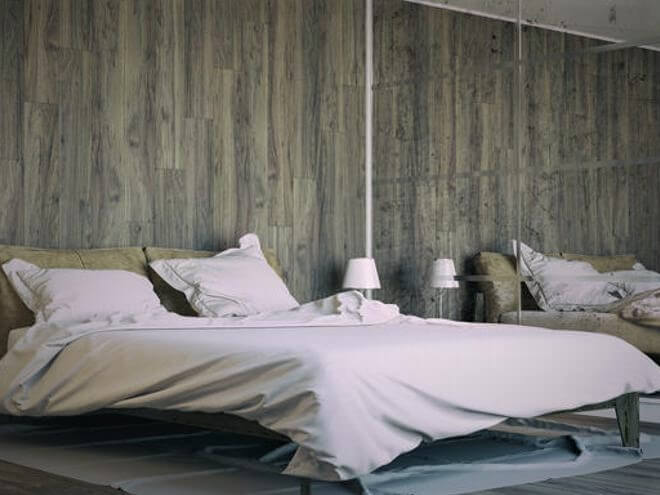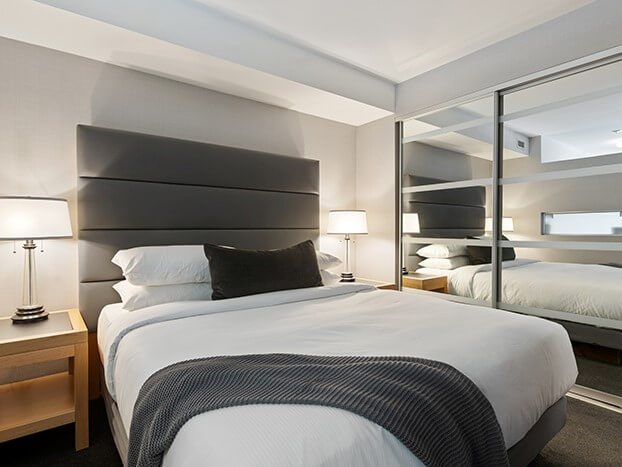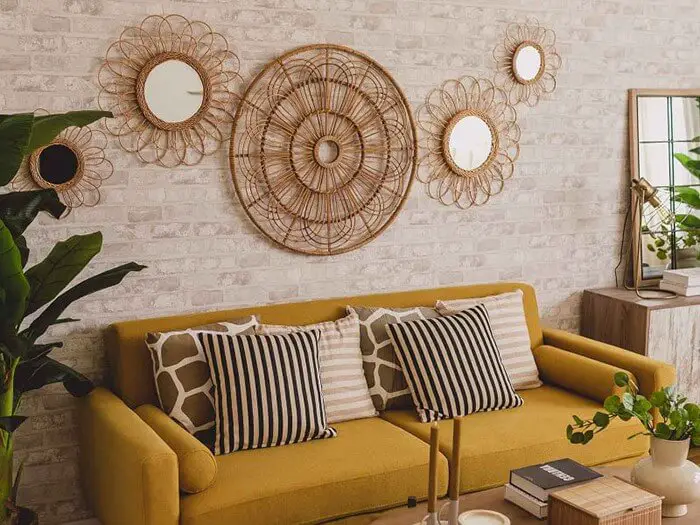Depending on where we place them, the flow of energy and our well-being can be influenced. There are places where you should avoid them!
Feng shui, a Chinese philosophy, suggests that the placement of mirrors can alter the energy in a room and affect our mood and health.
So, where do you have your mirrors? It’s important to be mindful of their placement and how they reflect light and energy. Feng shui is all about consciously and harmoniously occupying our space to bring positive energy into our lives.
Now, you might be thinking about rearranging your mirrors after hearing this. And I don’t blame you! Let me explain a bit more about how energy flows and how it can interfere with us. It’s fascinating stuff, trust me!

Facing the bed
If you’ve got mirrors in your bedroom, it’s time to think twice about where you’re placing them. According to the principles of feng shui, it’s not a good idea to have them facing the bed.
When we sleep, we’re at our most vulnerable. And if we’ve got a mirror reflecting us, it can mess with our energy levels. The constant flow of energy bouncing back and forth between the mirror and our being can leave us restless and unable to get a good night’s sleep.
And we all know our mood can take a hit when we don’t sleep well. So if you want to wake up feeling refreshed and energized, it’s best to keep those mirrors away from your bed!
In front of the house door
Did you know that placing a mirror in your home’s entrance hall can also be a no-go? It’s true! According to feng shui principles, having a mirror in front of your entrance door can disrupt the energy flow in your home.
When we enter our home, we want to feel a sense of calm and harmony. But if we’ve got a mirror reflecting the energy right back out the door, it can mess with that flow. The energy will bounce back and forth, leaving us feeling unbalanced and disoriented.
Negative reflections
it’s not a good idea to have your mirrors reflecting sharp corners or beams. This can create what’s called “poison arrows,” which can cause a sense of discomfort and unease. You’ll also want to avoid having your mirrors reflect any cluttered or messy spaces, as this can amplify feelings of chaos and stress.
Additionally, it’s best to keep your mirrors away from deteriorated objects, such as cracked or broken items. And don’t forget about garbage or bills – you don’t want your mirrors reflecting anything that could bring negative energy into your space.
The case of the bathroom
It’s best to reflect a pleasant area of the bathroom rather than an unpleasant one like the toilet.
Our bathrooms can be a place of relaxation and rejuvenation but also a source of stress and discomfort. If your bathroom mirror reflects the toilet, it can disrupt the energy flow in the room and make it feel less inviting.
How not to place them
When it comes to mirrors and good feng shui, it’s not just about where you’re placing them – it’s also about how you’re displaying them. Here are a few things to keep in mind:
Firstly, it’s best to avoid placing mirrors directly across each other. When you do this, you’re essentially creating an endless energy loop that can disrupt the energy flow in your space. Instead, try to place your mirrors in a way that promotes balance and harmony in the room.
It’s also important to steer clear of fragmented mirrors. These can scatter the reflection and weaken its ability to recharge your environment with positive energy. Additionally, it’s best to avoid placing mirrors where you can’t see your entire head, as this can create a sense of discomfort or unease.
Lastly, be sure to replace any mirrors that are worn, rusty, or damaged. Not only can these be unattractive, but they can also disrupt the flow of positive energy in your space.

Decorative mirrors: how to enlarge a room?
The two golden rules for using decorative mirrors to make a room appear bigger are to hang mirrors on the longer walls in rectangular rooms and to place two or three mirrors on opposite and perpendicular walls to create a game of reflections. However, mirrors should not be placed near stairs to avoid causing an unpleasant sensation or disorientation.

How to put decorative mirrors on the wall
When decorating a wall with mirrors, the type of mirror and placement can vary depending on personal preferences. One option is a full wall mirror, while another is an inclined mirror with a large frame and embossed design. The choice will depend on the desired style and the room’s overall decor.
Decorative mirrors: position is important
Today there is a wide range of decorative mirrors with a modern touch or a vintage mirror, large, small, and medium. The formats are also innovative: round, rectangular, and square mirrors with or without frames. It all depends on the personal taste of each one and the room where it will be placed. To help you, here are some ideas:
Entrance hall: you can place mirrors on the wall or floor, but make sure the space is well-lit to achieve a great effect.
Hallway: a sequence of small mirrors or several mirrors of different shapes and sizes on the walls can work well.
Living room: To determine the ideal spot for your mirrors, take the time to observe your living space. You can place them above the sofa to create a stylish and functional focal point or consider placing them on the floor to create a unique and modern look. Adding two mirrors in the living room can help enhance the space’s ambiance by brightening it up and creating a more spacious feel.
Bathroom: prioritize round and modern mirrors and consider covering an entire wall.
Bedroom: modern mirrors placed above the bed or on the nightstand can create a lighter look.
Vintage mirror: add a touch of charm to your home with a vintage mirror, which can be combined with contemporary furniture and bright colors. Consider placing it in an empty corner to add personality to the room. To maintain the harmony of your home, if you opt for antique mirrors, you must think about every detail to avoid overloading the space with too many mirrors or reflections.
